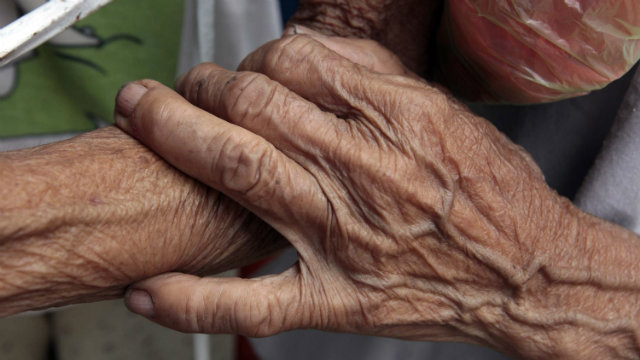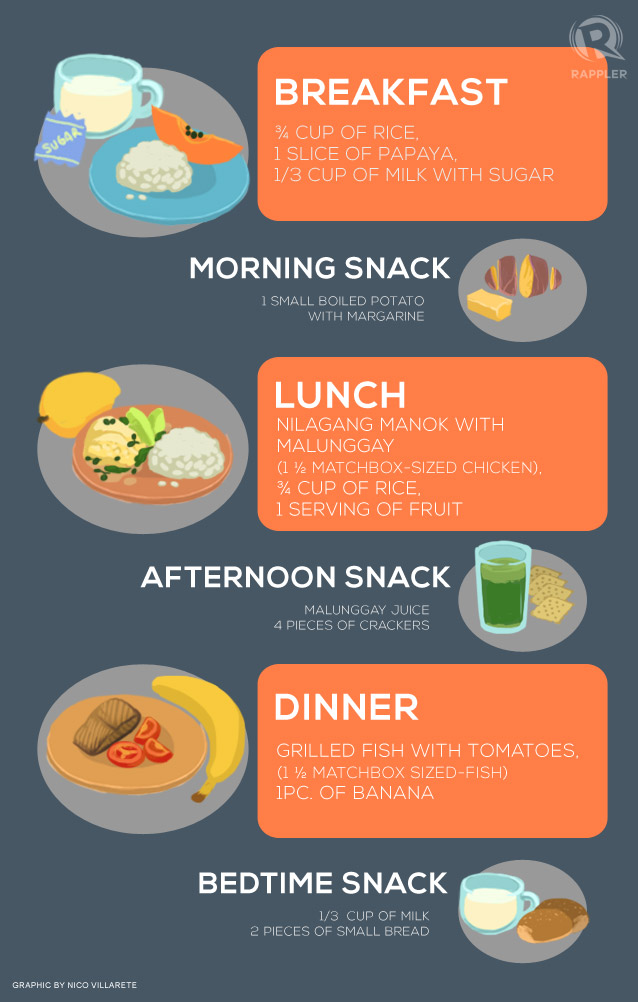SUMMARY
This is AI generated summarization, which may have errors. For context, always refer to the full article.

MANILA, Philippines – On the side of a bridge, a grandmother sat in an upright fetus position, with a small plastic cup on her left hand. Her eyes were closed and she spoke in a low voice, in between coughs.
She sits at her corner 6 days a week, morning till night. Monday is her only day off.
She is 79, got married at 28, and lost sight at 30. Since then, she found it difficult to work; she stayed at home with her children and grandchildren. She consulted an albularyo (herb doctor) and was told that her blindness was caused by a lamang lupa (mythical creature).
She had more to eat as a farmer in Sorsogon, than when she moved to Manila in the 1990s in search of greener pastures. (READ: Why PH agriculture is important)
Her husband was a construction worker, but passed away in 2001. It was the same year she started begging in the streets. (READ: PH economy ups and downs)
The widowed grandmother is only one of the country’s many senior citizens struggling with poverty. They are one of the disadvantaged sectors in Philippine society, according to the National Statistics Coordination Board (NSCB).
The latest poverty incidence among senior citizens was 15.8% in 2009, while the magnitude of poor was around 1.1 million, NSCB reported.
Many of them do not have any personal savings and social pension to rely on; hence they become dependent on their adult children. Some children, however, say they cannot take care of their aging parents.
An adult woman stood beside the grandmother. When asked about her mother’s condition, she replied, “E malakas pa siya, ‘yun [panlilimos] ang exercise niya. Wala kaming trabaho pare-pareho.” (She’s still strong, begging for alms is her exercise. We all don’t have jobs.)
Old, hungry
The latest statistics from the Department of Social Welfare and Development (DSWD) showed that there are over a million senior citizens in poor households nationwide as of 2011.
To help address the issue, DSWD provides a P500-monthly stipend for qualified senior citizens through its Social Pension Program. One of the program’s requirements, however, is for the beneficiary to be at least 77 years old.
In the 2000 census, senior citizens accounted for 34.9% of the total number of persons with disabilities (PWDs). Low vision was most common; other problems included difficulty of hearing, partial blindness, partial deafness, and total blindness.
Despite these conditions, it is still quite common to see some Filipino elderlies breaking their backs over arduous labor either at work or at home. (READ: PH female fisher folks)
The grandmother by the bridge earns around P200/day from begging in Quezon City. She splits this for their daily needs and for her grandchildren’s education.
She buys rice and pairs it with either bagoong, tuyo, instant noodles, or sardines. She sometimes asks for vegetables from neighbors. (READ: Hungry homes in resettlement sites)
“Kung meron, e ‘di meron. Kung wala, e ‘di pasensya,” she murmured. (If we have, then we do. If we don’t, then sorry.)
Her family often skips breakfasts and just waits for lunch. Sometimes they also skip dinner and just have coffee and bread as snacks.
A doctor assessed her and said she is underweight at 40 kilograms (kg). Her desirable body weight should be at least 50 kg. She was advised to eat well and to sleep earlier, but the grandmother said she is too worried about her family’s future to sleep properly.
Milagrina Jacinto, president of the Department of Health (DOH) League of Licensed Nutritionist-Dietitians Inc, said that the grandmother’s diet, activity, and age do not meet the right nutritional requirements, resulting in malnutrition.
Her food intake is high in sodium which may lead to hypertension and kidney disorders. The introduction of the same diet to her young grandchildren may lead to the same illnesses.
Jacinto advised the grandmother to practice personal hygiene, to start a healthy diet, and to get enough rest.
Healthy eating for the elderly

Jacinto suggested the sample menu above for undernourished elders who are also short on their food budget. “You don’t have to spend a lot to eat healthy.”
Among the elderly, eating healthy has the following benefits:
- Sharper mind
- Resistance to illness/disease
- Higher energy levels
- Stronger body
- Reduced risks of heart problems, stroke, high blood pressure, diabetes, bone loss, anemia
The elderly are advised to eat vitamin-rich food, leafy vegetables, whole grains, and fish. They can stay hydrated by eating more fresh fruits.
They must also maintain sufficient amounts of fiber, protein, and calcium in their diet, while successfully avoiding excessive sodium and sugar intake.
Jacinto also warned against “hidden sugar” like those in canned goods, fast food, and instant meals. “Always read the food labels, read first before you eat.”
A 2005 study from the Charing Cross Hospital in London said that the process of aging affects one’s nutrient intake, hence potentially increasing malnutrition risks.
Aging is associated with the following changes which can then impact one’s health:
- Decreased sense of taste or smell
- Missing teeth
- Decreased physical mobility (i.e., inability to shop and prepare meals)
- Poor appetite
- Nutrient malabsorption
Jacinto stressed the importance of adjusting meal preparations to meet the nutritional requirements of the elderly.
“Most of the elderly, they no longer masticate the food normally. Some have loose teeth; they also have a slower digestive system. They can’t eat hard foods. So we must adjust to these changes,” Jacinto explained.
She suggested steaming or sautéing vegetables, instead of boiling since this can drain nutrients. To help them chew and swallow easily, make sure that the meals are soft enough and are cut into small bite sizes. It is also practical to prepare homemade soups and fruit drinks.
“Don’t forget to eat with them too,” Jacinto added. – Rappler.com
Add a comment
How does this make you feel?
There are no comments yet. Add your comment to start the conversation.